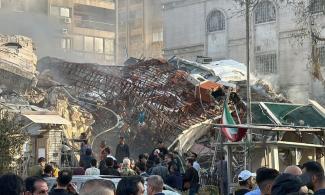
However, Israel did not immediately comment on the deadly attack in Damascus which comes at a time of soaring tensions over its Gaza war against Palestinian militants Hamas, and intensifying violence between Israel and Iran's allies.
The Syrian government has said that Israeli strikes on Monday reportedly destroyed the Iranian embassy's consular annex in Syria and killed no fewer than eight people including a Revolutionary Guards commander and wounded everyone inside.
AFP reports that Britain-based war monitoring group, the Syrian Observatory for Human Rights, confirmed that eight people were killed when the "Israeli missiles destroyed the building of an annex to the Iranian embassy."
However, Israel did not immediately comment on the deadly attack in Damascus which comes at a time of soaring tensions over its Gaza war against Palestinian militants Hamas, and intensifying violence between Israel and Iran's allies.
AFP reports that as a result of the strikes, the Iranian Embassy's annex building had caved in, and emergency services were rushing to treat the wounded and search for victims under the rubble, in the upscale Damascus district of Mazzeh.
According to Syria's Defence Ministry, "The attack destroyed the entire building, killing and injuring everyone inside, and work is underway to recover the bodies and rescue the wounded from under the rubble."
AFP quoted Iranian state TV as saying that among those killed by the strikes was a senior commander of the Islamic Revolutionary Guard Corps' foreign operations arm, the Quds Force, Brigadier General Mohammad Reza Zahedi.
The Observatory reportedly said it had "Confirmed the killing of a high-ranking leader who served as the leader of the Quds Force for Syria and Lebanon, two Iranian advisors, and five members of the Iranian Revolutionary Guard."
The Damascus strikes were said to be the fifth in eight days to hit Syria, whose President Bashar al-Assad is supported by Iran, Israel's long-time arch foe in the region.
SANA had earlier reported that "our air defence systems confronted enemy targets in the vicinity of Damascus".
Iran's Nour news agency reportedly said that "Hossein Akbari, ambassador of the Islamic Republic of Iran in Damascus, and his family were not harmed in the Israeli attack".
Akbari later said that "The Israeli attack on the Iranian consulate shows the reality of the Zionist entity which recognises no international laws and does all that is inhumane to achieve its goals".
Akbari told Iranian state TV that "At least 5 people were killed in the attack which was carried out by F35 fighter jets".
In a statement carried by official news agency SANA, Syrian Foreign Minister, Faisal Mekdad, reportedly denounced the attack after visiting the site.
Mekdad said, "We strongly condemn this heinous terrorist attack that targeted the Iranian consulate building in Damascus killing a number of innocent people."
Israel has also reportedly struck targets in Syria, mostly army positions as well as those of Iran-backed combatants including from Lebanon's Iran-backed Hezbollah movement.
The Damascus strikes came three days after the Observatory reported Israeli strikes that killed 53 people in Syria, including 38 soldiers and seven members of Hezbollah.
It was the highest Syrian army toll in Israeli strikes since the Israel-Hamas war began, said the monitor.
AFP quoted the Head of the Institute for Near East and Gulf Military Analysis, Riad Kahwaji, as saying that "Syria and Lebanon have become one extended battleground from the Israeli perspective.
"Israel warplanes hit targets in both countries almost daily in a sustained effort to destroy Hezbollah military infrastructure and to also tarnish the group's image."
He added that "Israeli strikes have clearly escalated in size and depth" in Lebanon.